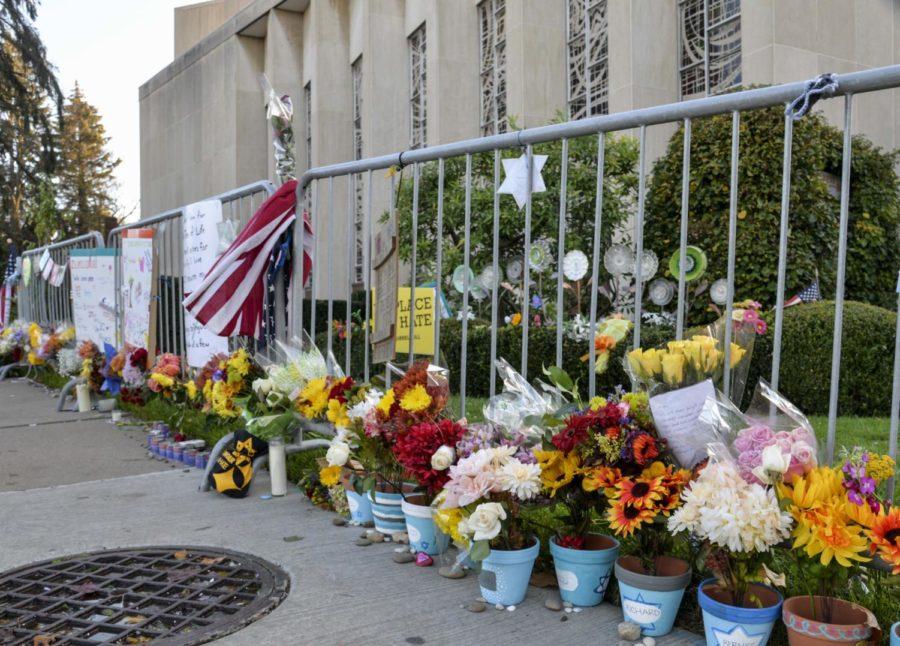Tree of Life documentary paints a soul-stirring portrait of a healing Pittsburgh
Flowers, candles and chalk drawings placed outside the Tree of Life Synagogue in 2019.
November 1, 2022
After watching the documentary “A Tree of Life: The Pittsburgh Synagogue Shooting” last Thursday, I hopped on a bus to Squirrel Hill and walked down Wilkins Avenue to the Tree of Life synagogue. The neighborhood was serene — fall foliage rustled in the breeze and boys in yarmulkes rode by the building on bicycles. I could hardly believe that on Oct. 27, 2018, an antisemitic massacre claimed the lives of 11 Jewish worshippers on the ground where I stood.
Four years after the deadliest antisemitic attack in our nation’s history, Pittsburgh is still a city in healing. The massacre at the Tree of Life sparked crucial conversations on antisemitism in America. “A Tree of Life: The Pittsburgh Synagogue Shooting,” which premiered on HBO on the eve of the attack’s fourth-year commemoration, serves to reignite those conversations and create a powerful portrait of a grieving community on the road to recovery.
The documentary opens with an aerial shot of the synagogue. The sound of a shofar and sirens ring through the air. Firsthand accounts of survivors and the families of victims interwoven with footage of the crime scene and the static of police scanners paint a horrifying picture of the massacre and its aftermath.
The documentary delves into the personal lives of the survivors and community members through a series of intimate interviews. Dan Leger, a nurse who was wounded in the shooting, said he came to terms with death in the moments after getting shot.
“I knew that it was very likely that I was going to be dead in a few minutes. I was on the stairs, and I didn’t feel afraid at that point. I had no sense of being afraid about the end of my life coming,” Leger said, in the documentary. “I thought about my life, and I thought, ‘Gee, I’ve had a wonderful life 一 my life has been so good. I’m so grateful for it.’”
Officials believe the shooter espoused a multitude of racist conspiracy theories and promoted xenophobia and antisemitism online. In the documentary, Ellen Surloff, former president of the Dor Hadash congregation that shares the synagogue with Tree of Life*Or L’Simcha and lost members in the massacre, said the shooter targeted the synagogue because of its efforts to aid refugee resettlement.
“The days that synagogues just leave their doors open and hope that no one comes through the doors with a gun 一 I think those days are gone,” Surloff said. “[The shooter] knew that we had something to do with immigrants.”
Brad Orsini, a national security advisor for the Secure Community Network, called for gun control in the wake of the massacre. In the documentary, he showed an antisemitic flyer distributed by the Klu Klux Klan around Squirrel Hill after the shooting, saying it underscored the need for gun regulation.
“These groups are emboldened, they’re empowered, and they’re vocal,” Orsini said. “If we didn’t change gun regulation and gun laws after Sandy Hook, I don’t know that we ever will. I hope and pray there’s a day when we do do that.”
The documentary also provides audiences a window into the everyday lives of those affected by the massacre. Poignant anecdotes and conversations shed light on their individual personalities, demonstrating that the survivors are more than just victims. It captures a charming candid moment of Joe Charny, an elderly survivor, celebrating a football win.
“I didn’t feel like watching the Steelers today because I was afraid they would lose, but I have to get the score,” Charny said, checking his phone. “Pittsburgh Steelers won 17 to 10! Mazel tov indeed.”
“A Tree of Life: The Pittsburgh Synagogue Shooting” arrives at a precarious moment in the conversation surrounding antisemitism in the U.S. Antisemitic rhetoric now commands the national spotlight as many public figures including the rapper Ye, formerly Kanye West, have publicly spewed unabashedly antisemitic hate speech on social media in recent weeks. Critics have also accused Doug Mastriano, the Republican nominee for governor of Pennsylvania, of promoting antisemitic conspiracy theories and Christian nationalism throughout his campaign.
These come as experts report an alarming rise in hate crimes and mass shootings across the country over the past several years.
It’s times like these when we need storytelling like “A Tree of Life: The Pittsburgh Synagogue Shooting” the most. Americans are becoming dangerously desensitized to violence and mass terror, with seemingly endless shootings perpetually consuming our national psyche. The documentary highlights the humanity of the victims of the Tree of Life massacre, emphasizing grief and healing at a personal, individual level. It’s a sobering reminder that the names on the news bear stories, not statistics.
“A Tree of Life: The Pittsburgh Synagogue Shooting” is also a cautionary tale. Hateful rhetoric is not harmless 一 words matter. The act of indulging in antisemitic epithets and stereotypes spawns the festering potential for violence. As false conspiracy theories spread like wildfire on social media, the documentary shows the devastating real-life repercussions of hate-fueled ideologies’ proliferation.
In the hours after viewing the documentary, I attended a vigil in Schenley Park and heard from several members of the Tree of Life community. To many of them, the congregation means home and the worshippers killed that day were a part of their family. Tree of Life’s grief sent shockwaves through Pittsburgh and beyond, and that pain will linger for generations.
“A Tree of Life: The Pittsburgh Synagogue Shooting” plays an instrumental part in documenting that horrific day and immortalizing the memories of the 11 lives lost.








